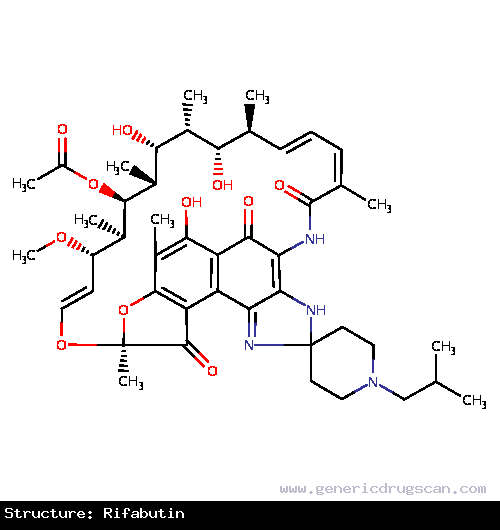Rifabutin Drug: Indication, Dosage, Precaution, Side Effect , Storage, Category Type and corresponding Brands - www.genericdrugscan.com
Rifabutin
Drug Status in USA : ApprovedDrug Status in Canada : Approved
pronunciation
pronounced as (rif' a byoo tin)
Why is this medication prescribed?
Rifabutin helps to prevent or slow the spread of Mycobacterium avium complex (MAC) disease in patients with human immunodeficiency virus (HIV) infection.
This medication is sometimes prescribed for other uses; ask your doctor or pharmacist for more information.
How should this medicine be used?
Rifabutin comes as a capsule to take by mouth. Rifabutin usually is taken once or twice a day. Take it on an empty stomach, 1 hour before or 2 hours after meals. If you have difficulty swallowing the capsule, you may empty its contents into applesauce. Follow the directions on your prescription label carefully, and ask your doctor or pharmacist to explain any part you do not understand. Take rifabutin exactly as directed. Do not take more or less of it or take it more often than prescribed by your doctor.
What are the precautions to be followed?
Before taking rifabutin,- tell your doctor and pharmacist if you are allergic to rifabutin, niacin, ethionamide (Trecator-SC), or any other drugs.
- tell your doctor and pharmacist what prescription and nonprescription medications you are taking, especially anticoagulants ('blood thinners') such as warfarin (Coumadin), blood pressure or heart disease medication, diabetes medications, digoxin (Lanoxin), methadone, oral contraceptives, zidovudine (Retrovir), and vitamins. Rifabutin decreases the effectiveness of some oral contraceptives; another form of birth control should be used while taking this drug.
- tell your doctor if you have or have ever had blood disorders or active tuberculosis.
- tell your doctor if you are pregnant, plan to become pregnant, or are breast-feeding. If you become pregnant while taking rifabutin, call your doctor.
What are possible side effects of this medication ?
Rifabutin may cause side effects. Skin, tears, saliva, sweat, urine, and stools may turn orange-brown; this side effect is normal and will stop when you finish taking this medication. Tell your doctor if any of these symptoms are severe or do not go away:- upset stomach or cramps
- vomiting
- headache
- altered sense of taste
- chest pain
- skin rash
- muscle aches
- severe headache
- fatigue
- sore throat
- flu-like symptoms
- vision changes
- unusual bruising or bleeding
- yellowing of the skin or eyes
How to store the medication and dispose it of after its use later?
Keep this medication in the container it came in, tightly closed, and out of reach of children. Store it at room temperature and away from excess heat and moisture (not in the bathroom). Throw away any medication that is outdated or no longer needed. Talk to your pharmacist about the proper disposal of your medication.
Drug Category/Class
- Anti-Bacterial Agents
- Antibiotics, Antitubercular
- Antimycobacterials
- Drugs for Treatment of Tuberculosis
- Antibiotics
- Cytochrome P-450 CYP1A2 Inhibitors
- Cytochrome P-450 CYP1A2 Inducers
- Antiinfectives for Systemic Use
- CYP3A4 Inhibitors
- Antibiotics
| Prescribed | For the prevention of disseminated Mycobacterium avium complex (MAC) disease in patients with advanced HIV infection. |
| Weight : | 847.0047 |
| Structure | Rifabutin |
 | |
| Formula | C46H62N4O11 |
Rifabutin has 3 Brands listed
| Macbutin (150 mg) | Mycobutin (150 mg) |
| Ributin (150 mg) |
Search Generic Drugs alphabetically
